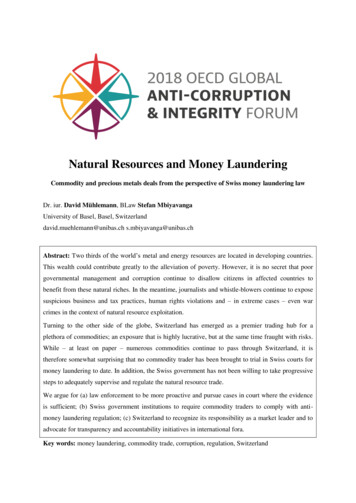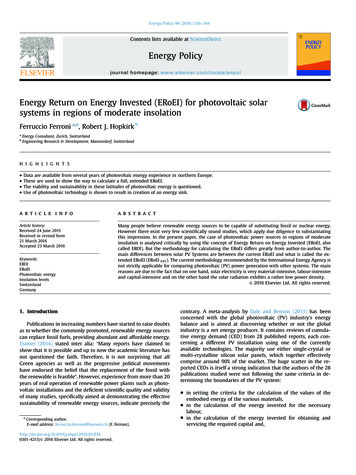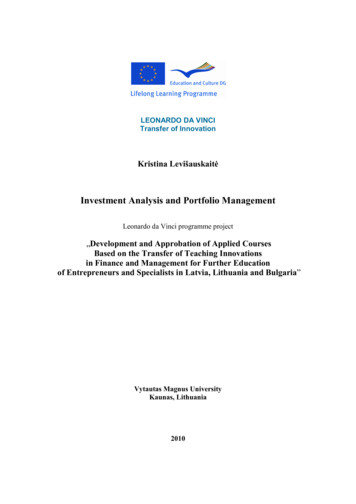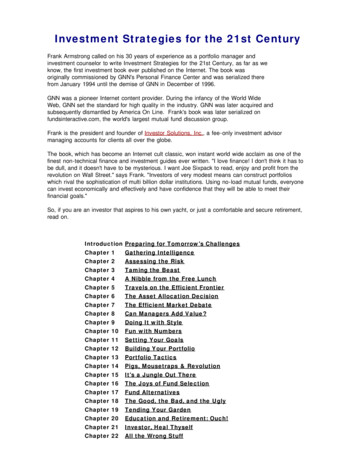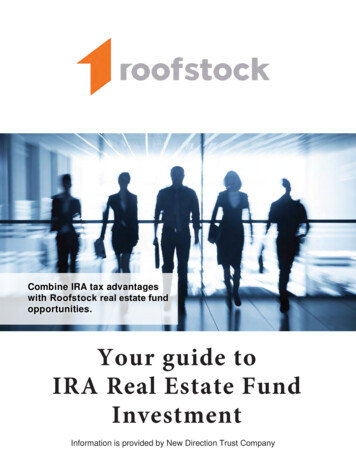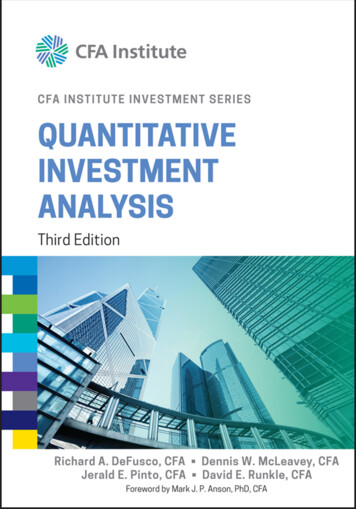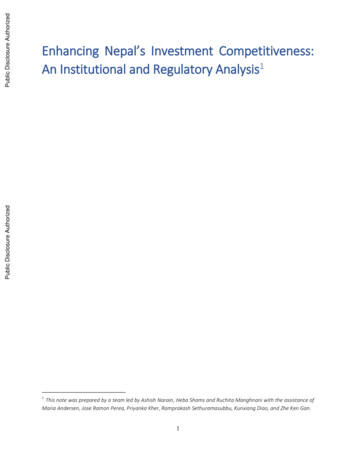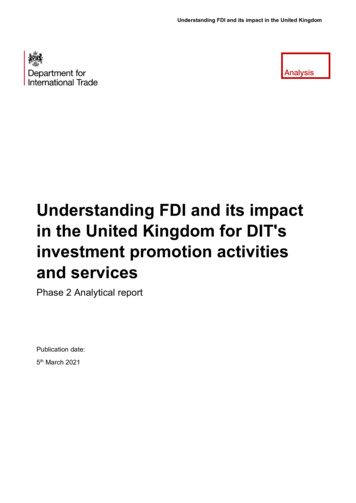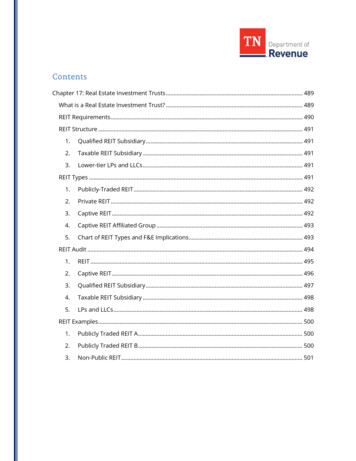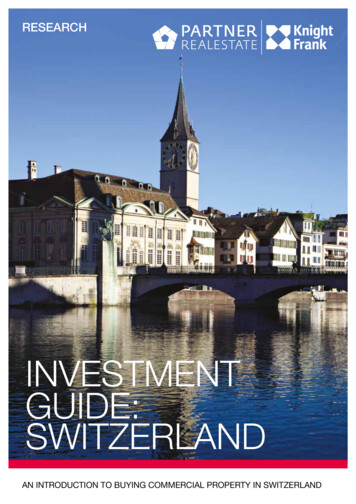
Transcription
RESEARCHINVESTMENTGUIDE:SWITZERLANDAN INTRODUCTION TO BUYING COMMERCIAL PROPERTY IN SWITZERLAND
Switzerlandin numbersPopulation8.3 millionGDP (2014)CHF 642 billion(c. 593 billion)GDP per capita(nominal 2014)CHF 78,432(c. 72,428)CPI inflation (Dec 15)-1.4%Unemployment rate(Q4 2015)4.7%Commercial propertyinvestment volume(2015)CHF 2.3 billion(c. 2.1 billion)Ten-year governmentbond yield (Dec 15)-0.06%Largest companiesheadquarted inSwitzerlandGlencore, Nestlé,Novartis, ZurichInsurance, RocheSource: Federal Statistical Office, Swiss NationalBank, Real Capital Analytics, ForbesWHY INVEST IN SWITZERLAND?Economic strength and stability:Switzerland has experienced relativelystable economic growth over the lastdecade, in comparison with otherEuropean economies. Its real estatesector is characterised by similarly stableconditions and low market volatility.Attractive business location:Switzerland is well established as alocation for international businesses, witha strong presence of companies from thebanking, insurance and pharmaceuticalsectors. There are 12 Fortune Global 500companies headquartered in Switzerland,an unusually high number for a countryof its size.Market size: With a value of CHF 2,516billion, the Swiss housing stock is worthfour times the country’s annual GDP.Commercial property represents a furtherCHF 430 billion.Residential investment opportunities:Switzerland’s large residential rentalproperty market is attractive to investors.Zurich fact boxPrime Tower, Zurich:Home ownership rates are low byinternational standards, with just under40% of the Swiss population living intheir own homes. Some 53% of the4.15 million dwellings in Switzerland arerental apartments.Investment returns: Real estateis currently seen as an attractiveinvestment proposition compared withother asset classes such as shares andbonds. Its appeal is boosted by its stabletotal returns, and while its long-termyields do not quite match those of Swissshares, real estate still outperformsSwiss bonds.Indirect investments: Indirectinvestment in real estate, through theacquisition of shares in listed propertycompanies or real estate funds, offersan alternative to direct investment. Therehas been a surge in the number andsize of indirect investment vehicles inrecent years, although they continue torepresent a relatively small part of theSwitzerland’s total property stock.Geneva fact boxPopulation390,000 (city),1.4 million (canton)Population197,000 (city),483,000 (canton)GDP (canton, 2013)CHF 137 billion( 127 billion)GDP (canton, 2013)CHF 48 billion( 44 billion)Total office stock9 million sq mTotal office stock4 million sq mOfficial languageGermanOfficial languageFrenchPrime office rentsCHF 800/sq m/annum ( 739/sq m/annum)Prime office rentsCHF 800/sq m/annum ( 739/sq m/annum)Prime office yields3.25%Prime office yields3.50%Key office sectorsFinance, banking,pharmaceuticalsand biotechnologyKey office sectorsFinance, banking,internationalorganisationsKey retail erhofKey retail locationsTop companiesheadquartered inZurichUBS, ZurichInsurance Group,Credit SuisseRue du Rhône, Ruede la Confédération,Rue du Marché, Ruede la Croix d’Or, Ruede RiveRichemont, SGS,FirmenichMercer global qualityof living ranking2 (of 230)Top companiesheadquartered inGenevaMercer global qualityof living ranking8 (of 230)Source: Knight Frank Research, Federal Statistical Office, Mercer, Forbes2Please refer to the important notice at the end of this report
SWITZERLAND LOCATION argauBaselCountyJuraAppenzell NCESt rnLake GenevaTicinoGENEVAValaisKEY CITIESITALYOTHER MAJOR CITIESGeneva3
INVESTMENT GUIDE: SWITZERLANDRESEARCHSWITZERLAND IS A GLOBAL FINANCIALCENTRE, CHARACTERISED BY ITSWEALTH, STABILITY AND INNOVATION.Property ownershipWho can own propertyin Switzerland?Under the federal “Lex Koller”legislation, the purchase of residentialproperty by foreign citizens is restrictedin Switzerland. EU citizens requireeither a permit B or C, while nonEU citizens must hold a permit C(permanent residency status). No suchrestrictions apply to the purchase ofcommercial property.Forms of ownershipReal estate ownership is defined inthe Swiss Civil Code (ZGB). The mostcommon forms of ownership includethe sole or collective ownership of anentire property, the ownership of anapartment (“Stockwerkeigentum”) or aground lease.Commerciallease structuresIn general, lease agreements inSwitzerland are governed by the SwissLaw of Obligations (OR). However,tenants and lessors are free to arrangethe tenancy agreement as long as sucharrangements comply with protectivenorms laid down by legislation.Rents: For most real estate inSwitzerland, rents are quoted in Swissfrancs per square metre (either permonth or per year). In the case of retailproperty, a revenue-dependent rent isoften agreed in addition to a base rent.Rents are usually paid either one monthor three months in advance.Lease lengths: Commercial propertyis generally let under fixed-termagreements for 5 to 10 years, withthe option to extend the lease periodThe main forms of property ownership are:Sole ownership:Sole ownership of real estate is acomprehensive legal position accordingto Swiss law, which gives the singleowner the sole right to control anddispose of the property.Shared ownership:Several persons or entities own aproperty. There are several types ofshared ownership: ollective ownership (“Miteigentum”):CShares of an undivided property areallocated to several persons. Each coowner is registered with an ownershipshare and has the right to dispose oftheir share independently. wnership in commonO(“Gesamteigentum”):A property is owned by a group ofindividuals, which is established bystatutory provision. Each person ownsa share of the entire property, but doesthereafter. The maximum lease term forfixed-term agreements in Switzerland is25 years. Lease agreements with steppedrental payments must be signed for aminimum of three years.Break clauses: Early termination rightscan be agreed between the tenant andthe landlord.Rent revisions: Fixed-term rentalagreements with a term of at least fiveyears are usually indexed to the SwissConsumer Price Index. Adjustments canbe made every year. Stepped rents areincreased annually by a predeterminedamount. Stepped rents cannot becombined with indexed rents.Repair and maintenance costs:The owner of residential property bearsall costs for maintenance and repair,unless only minor costs are involved.Commercial property is commonly letwith basic tenant fit-out. This means thatnot have the right to dispose oftheir share independently. Condominium ownership(“Stockwerkeigentum”)A special type of shared ownership,which usually relates to residentialapartments. The owner of acondominium has full ownership ofa designated part of a building (anapartment) and co-ownership ofcommon areas within the property.Ground lease (“im Baurecht”):The beneficiary of a ground lease mayerect a building on an area of land, ormay use an already erected building.A ground rent is paid to the owner ofthe land. In Switzerland, a groundlease generally lasts for a maximumperiod of one hundred years. At theend of this period, ownership of theconstruction falls to the owner ofthe land, who is obliged to pay anadequate compensation for receipt ofthe building (“Heimfall”).the landlord provides andmaintains the basic fit-out, while thetenant is responsible for maintainingtheir specific installations.Service charges and utilities: Unlessotherwise stipulated in the rentalagreement, utility costs such as waterand heating are paid by the tenant.These costs can be included in the rent,paid separately to the landlord or paiddirectly to the suppliers by the tenant.Only costs that are related to operatingthe property are considered utilities.Mortgage interest rates or buildinginsurance costs cannot be passed onto the tenant.Subletting: The subletting of a rentalproperty is permitted in Switzerland,as long as the landlord does not objectfor valid reasons. As such, the tenantis obliged to seek consent from thelandlord (or the building management)for any sublease.4
INVESTMENT GUIDE: SWITZERLANDRESEARCHFees payable onproperty purchasesTransfer duty: Most Swiss cantons levy atransfer tax as part of a property purchase.The rate varies between around 0.5% and3% of the transaction price dependingon the canton. The tax is usually paid bythe buyer, but in some cantons it is splitbetween both parties.Land registry and notary fees: InSwitzerland, the transfer of real estateis subject to cantonal and/or municipalland registry and notary fees. Based on atransaction involving a purchase price ofCHF 10 million, land registry and notary feescombined would typically range between0.1% and 1% of the transaction value.Roche Tower, BaselPurchasing andowning propertyProperty acquisition process: Aproperty purchase contract has tobe publicly certified by a notary andentered into the local land register.In some cantons, the same officeis authorised to carry out both thenotarisation and land register entry.In other cantons, independent notariesare entitled to grant the certification.Agents’ fees: Real estate agency fees areusually around 3% of the purchase price ofthe property, plus VAT. In general the fee ispaid by the seller, unless otherwise agreedin advance.VAT: The sale of real estate is generallyexempt from VAT in Switzerland. However,the seller can opt for VAT to apply to thesale under certain conditions. In suchcases, the standard rate of 8% applies.Taxes associated withthe ownership and saleof propertyReal estate tax: An annual real estatetax (“Grundsteuer”) must be paid in someSwiss cantons. The tax is levied atthe cantonal or municipal level,at various rates up to 0.3% of theproperty value. As a general rule,corporate entities pay a higherreal estate tax rate than privateproperty owners.Income tax: Net income derivedfrom rental properties – that is, rentalincome after running and financingcosts – is subject to either personalor corporate income tax. Privateand corporate tax rates are set bymunicipalities and can thereforevary greatly.Capital gains tax: Capital gainsarising from a property saleare subject to capital gains tax(“Grundstückgewinnsteuer”). The taxrate depends on both the net gainand the holding period. Different rulesapply for corporate entities, wherebycapital gains are subject to normalcorporate tax. Furthermore, publiclimited real estate corporations aresubject to capital gains tax in onlysome Swiss cantons.Tax on imputed rental value: InSwitzerland, an owner of a privatelyused home is subject to a tax on animputed rental value (“Eigenmietwert”).The imputed rental value is estimatedannually by each canton and taxed atthe personal income tax rate.DefinitionsValuation methodologyYields: Yield definitions can varybetween sectors and investors. Primeyields for commercial property inSwitzerland are usually quoted as netinitial yields (net earnings divided bythe gross purchase price) for fully letprime properties in the best locations.Valuation standards used in Switzerlandare increasingly converging withinternationally accepted standards.As such, the International ValuationStandards (IVS) and the standards of theRoyal Institution of Chartered Surveyors(RICS) are commonly followed.For the valuation of investment propertyin Switzerland, the most commonly usedvaluation method is the discounted cashflow method. This is also considered tobe best practice within the real estateconsulting industry.Rue du Rhône, Geneva5In the private residential property market,either the sales comparison approach(depending on the availability of transactiondata) or the hedonic valuation model iscommonly used for valuation purposes.Real estate funds are subject to theCollective Investment Schemes Act(CISA). According to CISA, a propertyvaluation assignment for real estatefunds can only be carried out by anappraisal expert who is approved bythe Swiss Financial Market SupervisoryAuthority (FINMA).Bahnhofstrasse, Zurich
COMMERCIAL BRIEFINGFor the latest news, views and analysisof the commercial property market, N – SWISS DESKJoachim von RadeckePartner, European Capital Markets 44 20 7861 1523joachim.radecke@knightfrank.comLONDON – EUROPEAN RESEARCHMatthew Colbourne, Associate 44 20 7861 1238matthew.colbourne@knightfrank.comHeena Kerai, Analyst 44 20 7861 5386heena.kerai@knightfrank.comGENEVARobert Curzon PricePartner, Partner Real Estate 41 22 322 22 70robert.curzon@partnerrealestate.chZURICHAbi PranjesPartner, Partner Real Estate 41 44 266 68 58abi.pranjes@partnerrealestate.chKnight Frank acknowledges theassistance of Wüest & Partner withresearch for this report.Knight Frank Research provides strategic advice, consultancy services and forecasting to a wide range ofclients worldwide including developers, investors, funding organisations,corporate institutions and the publicsector. All our clients recognise the need for expert independent advice customised to their specific needs.RECENT MARKET-LEADING RESEARCH PUBLICATIONSEUROPEANEUROPEANQUARTERLYCOMMERCIAL PROPERTYOUTLOOK 2016THE 2016 REPORTRESEARCHGLOBAL CITI ESRESEARCHCOMMERCIAL PROPERTY OUTLOOKQ4 2015GLOBALCITIESTHEWEALTHREPORTThe global perspective on prime property and investment2016THE 2016 REPORTTHE FUTURE OF REAL ESTATE INTHE WORLD’S LEADING CITIESImportant Notice Knight Frank LLP 2016 – This report ispublished for general information only andnot to be relied upon in any way. Althoughhigh standards have been used in thepreparation of the information, analysis, viewsand projections presented in this report, noresponsibility or liability whatsoever can beaccepted by Knight Frank LLP for any loss ordamage resultant from any use of, reliance onor reference to the contents of this document.As a general report, this material does notnecessarily represent the view of Knight FrankLLP in relation to particular properties orprojects. Reproduction of this report in wholeor in part is not allowed without prior writtenapproval of Knight Frank LLP to the formand content within which it appears. KnightFrank LLP is a limited liability partnershipregistered in England with registered numberOC305934. Our registered office is 55 BakerStreet, London, W1U 8AN, where you maylook at a list of members’ ITIESPROPERTY WEATHER MAP FOR 2016European CommercialProperty OutlookOCCUPIER TRENDSINVESTMENT TRENDS10th EditionMARKET INDICATORSEuropean QuarterlyGlobal Cities ReportKnight Frank Research Reports are available at KnightFrank.com/ResearchThe Wealth ReportPublication Date: March 2016
Real estate tax: An annual real estate tax (“Grundsteuer”) must be paid in some Swiss cantons. The tax is levied at the cantonal or municipal level, at various rates up to 0.3% of the property value. As a general rule, corporate entities pay a higher real estate tax rate tha
